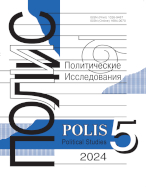Which country is easier to deal with? Identity of the residents of Shanghai and St. Petersburg
Pan Dawei,
Prof., Director of Russia and Central Asia Research Center, Shanghai Academy of Social Sciences, Shanghai, China, pandw29@hotmail.com
DOI: 10.17976/jpps/2014.02.10
Pan Dawei Which country is easier to deal with? Identity of the residents of Shanghai and St. Petersburg. – Polis. Political Studies. 2014. No. 2. https://doi.org/10.17976/jpps/2014.02.10
The article is based on the data of an exploration carried out in Shanghai and in St. Petersburg by Chinese sociologists jointly with a research group from the Institute of Sociology, RAS. The respondents were estimating the degree of easiness of establishing contacts and cooperation. The conducted polls demonstrated that the Chinese-Russian cooperation rests not only on fair political, economic an legal foundations, but also on a broad social basis. Furthermore, the younger the respondent was, the more positive was his/her attitude toward the potentials of cooperation. The influence of the level of respondents’ education on their estimations was also heeded. The data received have been “inscribed” into a wider context of cooperation – with Germany, USA, Japan, Poland and Great Britain. Comparing the polls among the residents of Shanghai and of St. Petersburg in relation to different of these countries, the author makes the fundamentally substantiated conclusion: firm, long-term relations of mutual trust in every case can be established only given the interests of both contracting parties are taken into consideration, and only on condition of respect for cultural diversity. The global world, saturated with inter-personal contacts, economic interchange, political cooperation, gives birth to real prerequisites for harmonic coexistence of countries with different history, with differing cultures, leaving irrevocably in the past the idea of clash of civilizations. For which it is very important to go on consolidating mutual understanding, ensuring that the idea of good neighbor relations consolidate in the mass consciousness.
See also:
PANORAMA OF POLITICAL SCIENCE IN RUSSIA: ST. PETERSBURG. – Polis. Political Studies. 2001. No3
Smorgunov L.V.,
Political identity and the concept of the political. – Polis. Political Studies. 2012. No6
Art’omov G.P., Avdiyenko D.A., Popova O.V., Chazov A.V.,
The Electorates of Political Associations in Russia: Experience of an Exit Poll in St.Petersburg. – Polis. Political Studies. 2000. No2
Sergeev V.M., Kuzmin A.S., Alekseyenkova Ye.S., Kazantzev A.A.,
Moscow and St. Petersburg as Centers of Attraction of Social Nets. – Polis. Political Studies. 2007. No2
Vishn'evsky B.L.,
The Petersburg Electoral “Marathon” and Its Lessons. – Polis. Political Studies. 2000. No4





.jpg)






 print
print
.jpg)
.jpg)